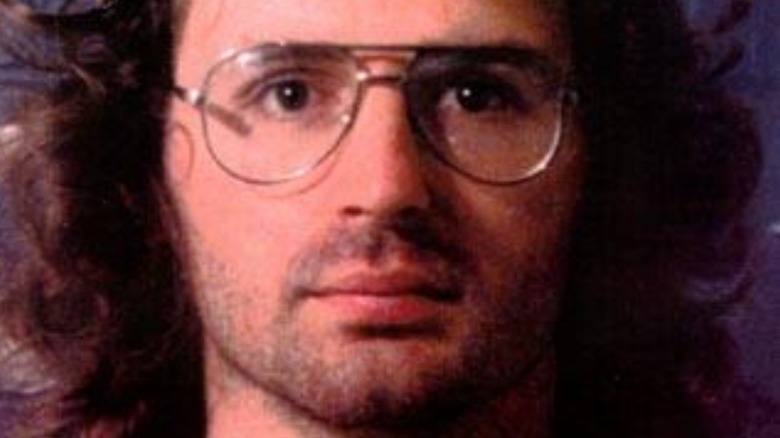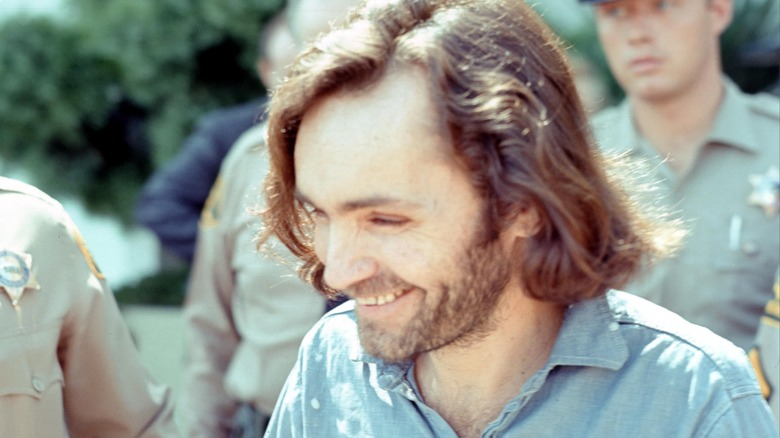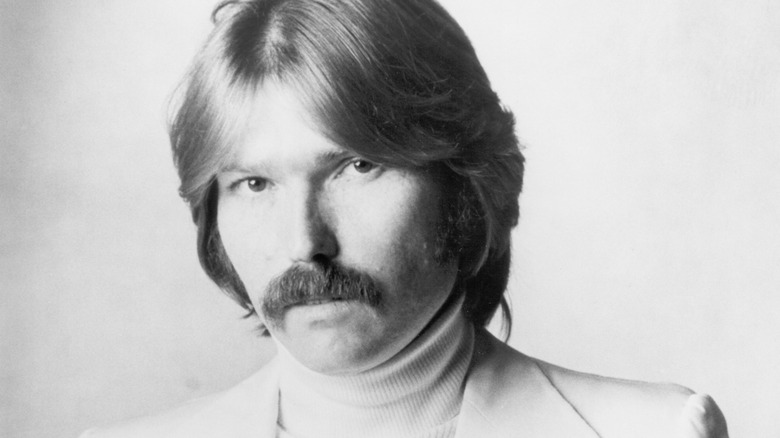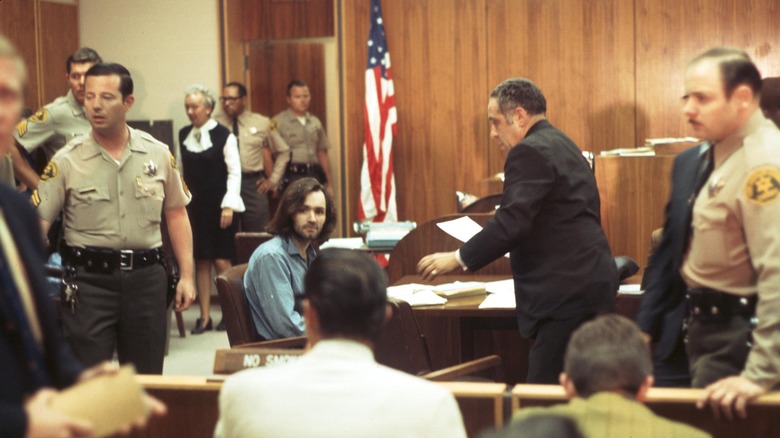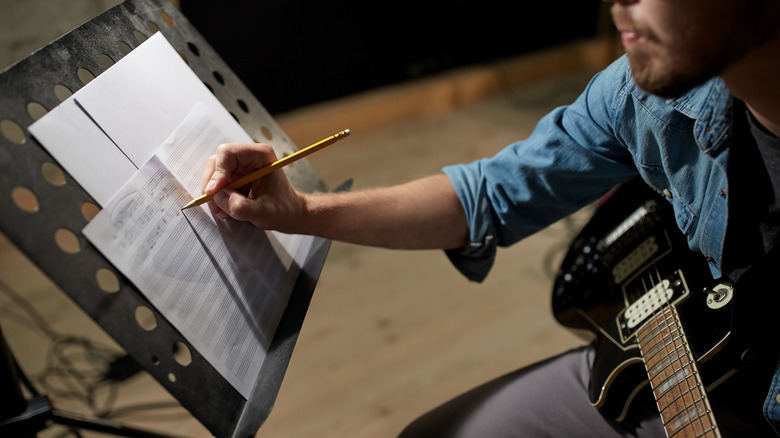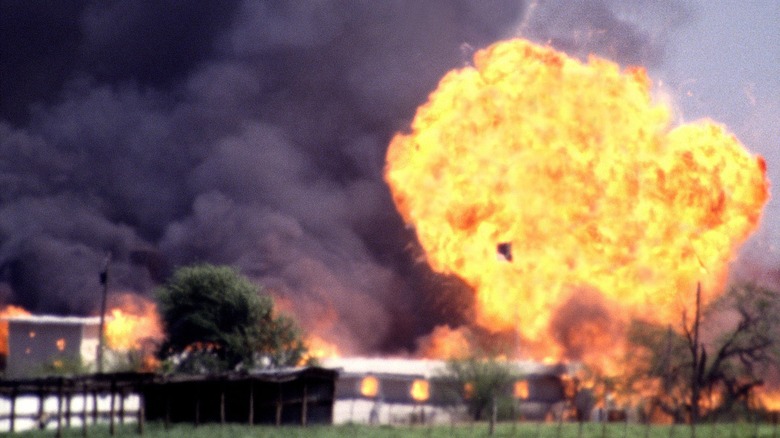The One Major Thing Charles Manson And David Koresh Had In Common
Charles Manson and David Koresh sometimes pop up in the same conversation when discussing some of American history's most notorious cult leaders. Manson was the evil string-puller behind the Tate-LaBianca murders that horrified the world and landed himself and several of his so-called family members in prison, per Britannica. Around 25 years later, Koresh (above) stole headlines when he and his followers, the Branch Davidians, engaged in a weeks-long standoff near Waco, Texas, with federal authorities that wound up with dozens of cult members dead, including Koresh himself.
The two men had different beliefs and philosophies, but something they shared was that before leading cults, both of them tried their hand at starting music careers. Any success they had in music — and it was minimal — was easily eclipsed by their cult-leading exploits and violence, which helped raise their musical profiles. According to Tone Deaf, Manson released his debut album, "Lie: The Love and Terror Cult" in 1970, the same year he and his family were in court facing murder charges.
Charles Manson's music career
Charles Manson's early life with riddled with criminal activity, by both himself and those around him. His mother was arrested for armed robbery when he was a kid, per Britannica, which led to him having to live with relatives in West Virginia at a young age. Manson soon followed his mother's lead and found himself wrapped up in the American criminal justice system when he was just 9 years old. From that point on he bounced around between juvenile detention centers and prisons for a variety of offenses, including stealing cars and armed robbery.
According to The New Yorker, during one of his stints in prison, Manson learned how to play guitar as the pupil of a career criminal and gang member known as Alvin "Creepy" Karpis. He not only learned how to play guitar but started writing his own music. Manson ingratiated himself with members of the hippy movement in the San Francisco Bay Area and he started amassing a following, consisting of mostly young runaways.
Manson — with his "family" in tow — moved south to Los Angeles, where he eventually made friends with some heavy hitters in the music industry, including Beach Boys drummer Dennis Wilson. According to NME, Wilson took one of Manson's songs, "Cease to Exist," and morphed it into the Beach Boys tune "Never Learn Not To Love." That song wound up on the Beach Boys album "20/20," but Wilson's bandmates didn't know until later that the song had originally come from Manson (via Lethal Amounts).
Manson meets Melcher
Wilson allowed Manson and company to crash at his house until the cult leader's Charles Manson-ish ways became too much for Wilson, who ended up leaving his own home. According to Rolling Stone, before things got to be too much for Wilson to handle, he introduced Manson to some of the movers and shakers in the Los Angeles music scene, and Manson repaid him by introducing him to heroin. One of the people Manson met was a hotshot producer named Terry Melcher. Melcher was the son of actress Doris Day, and he worked as a producer and songwriter for big-name acts like the Byrds and the Beach Boys.
Manson is thought to have hounded Melcher about signing him to a recording deal, and while Melcher entertained the idea — even going so far as to pay Manson a visit at the Family's compound at the Spahn Ranch — he didn't think Manson had what people in the business like to call "it." Many have speculated that Manson didn't like being told no by Melcher, so he sent a group of his followers up to Melcher's home at Cielo Drive in the Hollywood Hills with orders to kill anyone and everyone inside. The problem was that Melcher didn't live there anymore and the house was being rented by director Roman Polanski and his wife, actress Sharon Tate, at the time.
The Tate-LaBianca murders thrust Charles Manson and his music into the spotlight
There are better ways to get your music in front of people than by having your followers commit some of the most atrocious murders of the 20th century, but that's what Charles Manson did. Manson and some of his followers were charged with the August 9, 1969 murders of Sharon Tate, her friend Jay Sebring, writer Wojciech Frykowski, and coffee heiress Abigail Folger, as well as the deaths of Leno LaBianca and his wife Rosemary the next night (via Britannica). The case received widespread media attention, and perhaps realizing that he could use that to his advantage, Manson asked Phil Kaufman, a man he knew from his time in the local music scene, to release his music for him. Kaufman at one point managed Gram Parsons and was a roadie for the Rolling Stones and Frank Zappa, per The New Yorker.
According to Ultimate Classic Rock, that's just what Kaufman did. He raised enough money to churn out 2,000 copies of Manson's album "Lie: The Love and Terror Cult," which was released by Awareness Records, who up to that point were most notable for having released Bob Dylan's "The Great White Wonder." Despite the fervor surrounding Manson's murder case, his album sold just 300 copies. The most traction his music career ever got stemmed from other artists occasionally covering his songs — likely just for shock value — with perhaps the most notable being Guns N' Roses' version of the song "Look At Your Game Girl," which appears on the band's album "The Spaghetti Incident."
David Koresh had dreams of making it in music
A couple of decades after Manon's vain attempts at cracking into the music business, another soon-to-be cult leader tried to make it on his own. David Koresh — best known as the leader of the Branch Davidians — was known to have spent time in Los Angeles writing and recording music. However, while Manson's folk-rock masked his murderous tendencies, Koresh's music put his religious fanaticism front and center, per The A.V. Club.
According to the Los Angeles Times, signs of Koresh's future were apparent as long as 10 years before the siege at the Branch Davidian's compound near Waco, Texas that led to his death. In the early days of his time with the Branch Davidians, Koresh went by his birth name, Vernon Howell, per Dangerous Minds. In his early 20s, Koresh had been kicked out of his church for trying to marry the pastor's daughter, and that led him to Los Angeles where he tried — and failed — to make it in music.
Koresh wrote songs that centered on his church's beliefs and covered topics like the return of Jesus Christ, among others. He also happened to pen a song with a strangely prescient title: "Mad Man in Waco."
Koresh tried to use music to his advantage
Once the Branch Davidians had set up shop at Mount Carmel — their infamous compound — Koresh tried to get a foothold in the local music scene, not with aspirations of springboarding his career, but instead, growing his cult. According to Dangerous Minds, Koresh booked concerts at a club in Waco and would invite musicians out to Mount Carmel, where the Branch Davidians had an impressive music set up, with enough gear to make any starving musician's mouth water. Once they were at Mount Carmel, Koresh would start discussing Branch Davidian topics and trying to draw them into the fold. Many musicians found this off-putting, but it worked on others.
Following the 51-day Waco Siege that resulted in the death of Koresh and dozens of his followers, some of his recordings fell into the hands of a man named Kirk Kaufman. With the blessing of Koresh's mother, Kaufman released "Voice of Fire," an album consisting of Koresh's music and some clips of him speaking. The late cult leader's mother asked that proceeds from the album go toward supporting one of the many children he had fathered, per the Los Angeles Times.
